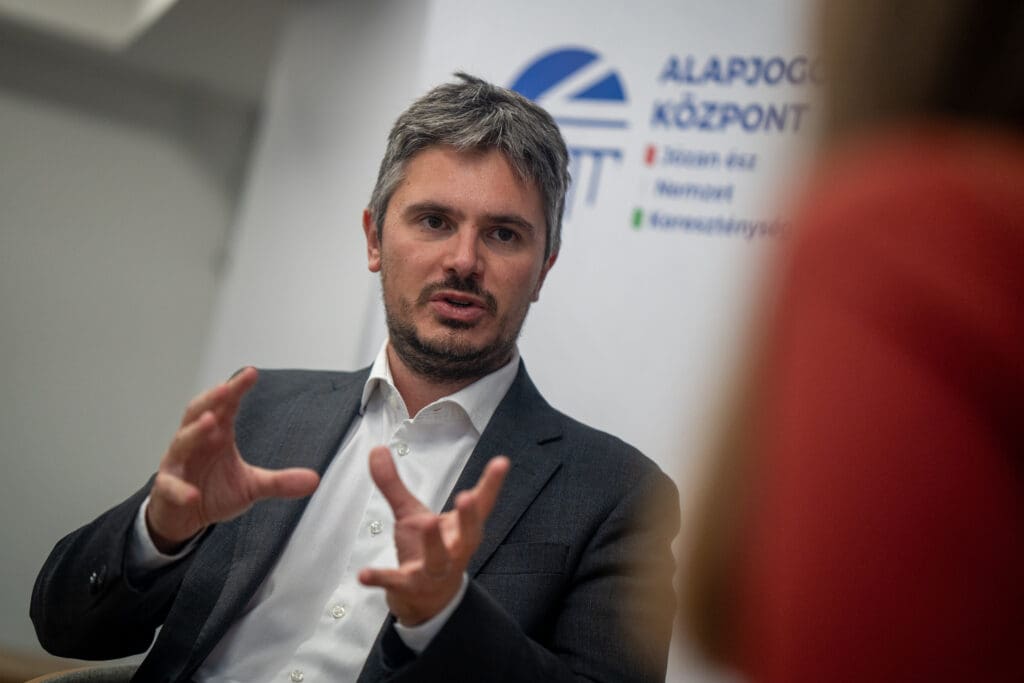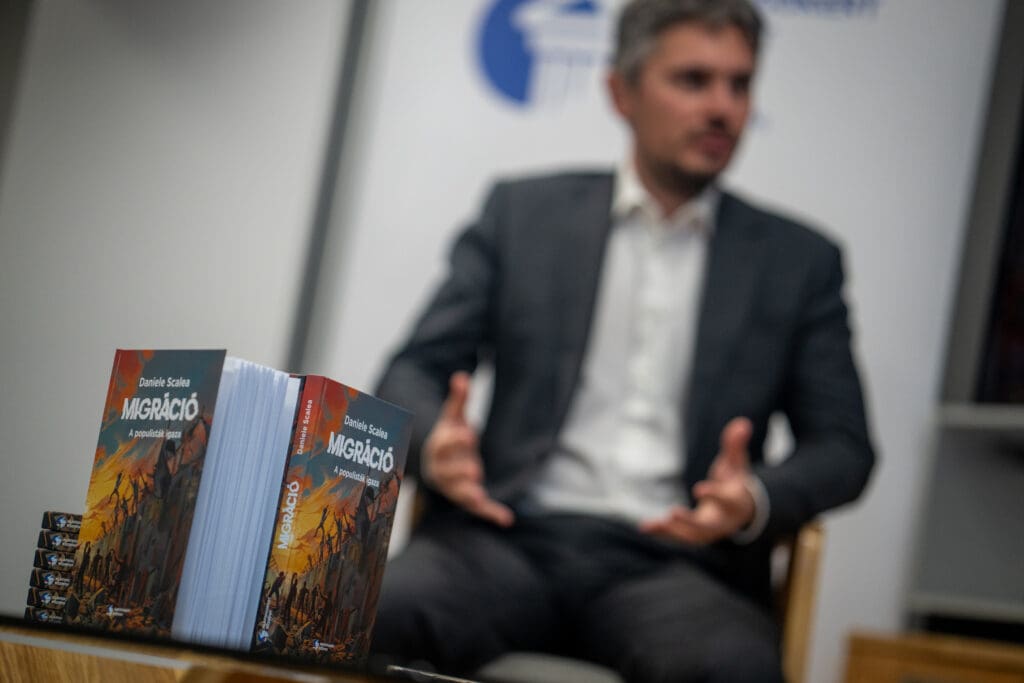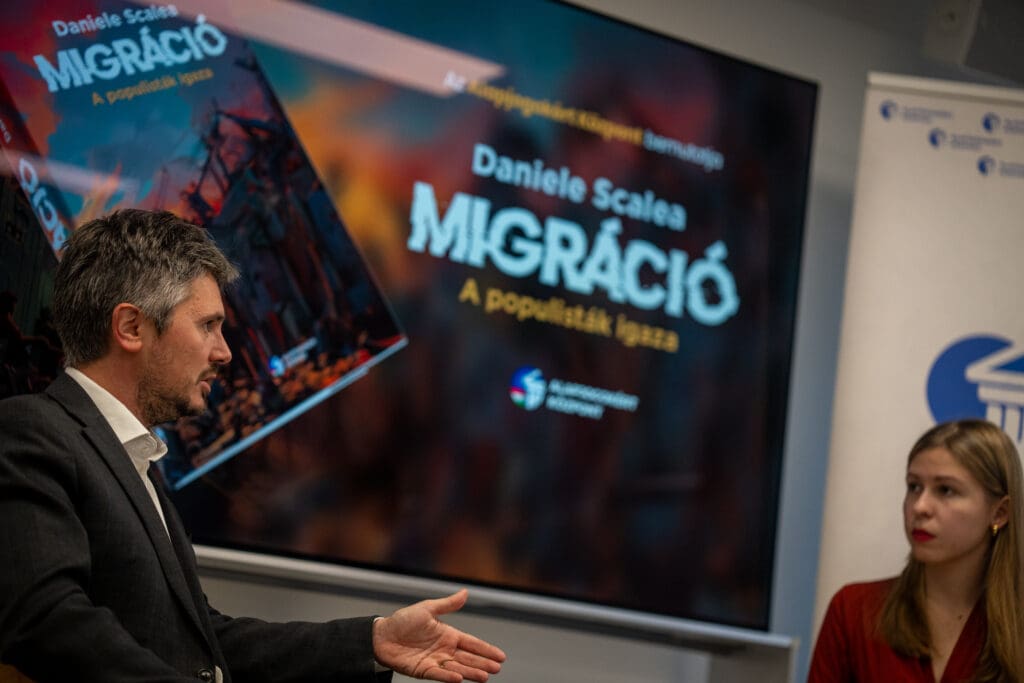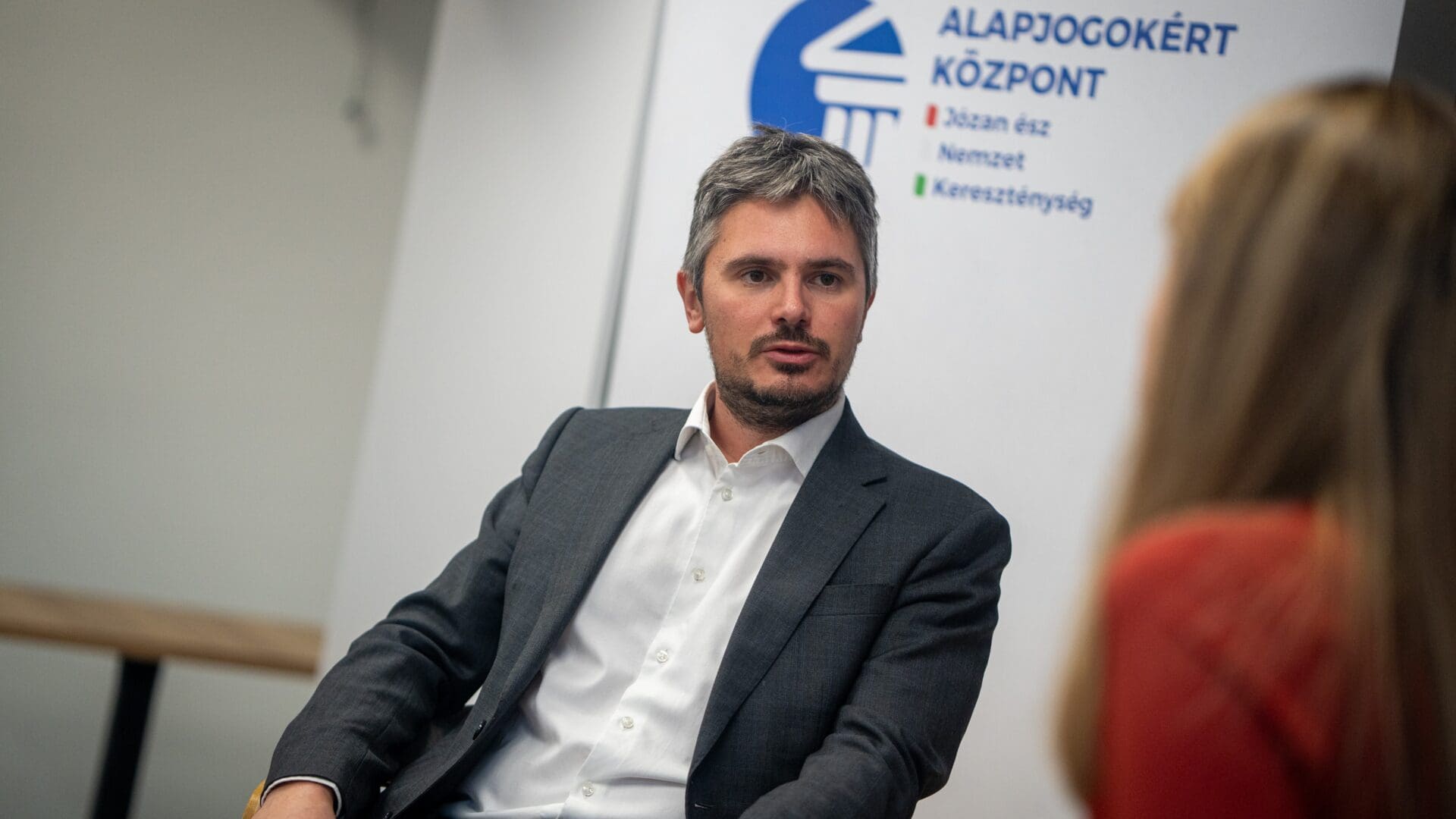Daniele Scalea is founder and President of Centro Studi Machiavelli. He graduated in Historical Sciences from the University of Milan and has a PhD in Political Studies from Sapienza University, He is professor of History and Doctrine of Jihadism and Geopolitics of the Middle East at Cusano University. From 2018 to 2019 he was Special Advisor on Immigration and Terrorism to the Undersecretary of Foreign Affairs Guglielmo Picchi. His latest book as editor is L’attualitá del sovranismo. Tra pandemia e guerra (The Topicality of Sovereigntism. Between Pandemic and War), which has recently been translated into Hungarian and published by the Center for Fundamental Rights. Hungarian Conservative interviewed Mr Scalea at the book launch in Budapest.
***
Could you please describe briefly what your book titled Immigrazione. Le ragioni dei populisti is about and explain its relevance to our readers? Also, as it was first published in Italian back in 2019, have any updates been necessary for the Hungarian edition?
In a nutshell, the book is about the real numbers of immigration that many people in the general public actually didn’t know or still do not know about. So the way it is understandable is the ethnic replacement of the Native European peoples.
The real impact on an economic and social point of view, using scholarly research, also mainstream scholarly research that point out our mass and regulated immigration as having a very high toll from a social and economic point of view, especially for the middle class and the lower classes. It also offers an explanation of why in the neo-Marxist left, it is considered so important to achieve this project of multiculturalism that actually is ethnic replacement.
Regarding the update, yes, I have made some update for the Hungarian edition about the numbers. So all the statistics are updated to the last available 2022, 2023.
Apart from the numbers, what has also changed since 2019 is that then there was the Conte government in Italy, in which Matteo Salvini was interior minister. He managed, very successfully, to curb illegal arrivals in Italy.
After his time, those arrivals practically skyrocketed.
We are very close to record numbers with more than 130,000 illegal arrivals in Italy by mid-October. So the situation is quite different now: in 2019, we were witnessing a positive moment with a very positive trend, especially in terms of the numbers in Italy. Whereas in 2023, the trend is quite negative. So, I can say that the alarm bell is ringing again.
The migration situation along Hungary’s southern borders has recently deteriorated, raising concerns about potential confrontations between immigrants and Hungarian law enforcement. In view of that, we Hungarians have been closely monitoring the developments in Lampedusa with a mix of concern and empathy. Could you provide an update on the current situation in Lampedusa? How does the Italian public assess the situation?
Well, the situation in Lampedusa is not really a crisis any more, because it has been the same for many years, given that it’s the closest island to Africa. But we shouldn’t focus just on Lampedusa only, because these illegal landings are happening in large numbers in Sicily, even in Sardinia, and in other southern regions. Also, about 15 per cent of the arrivals are by the land route from the Balkans, with migrants entering from the north-eastern part of Italy.

The government is struggling to manage this new situation essentially for two reasons. The first one is that Georgia Meloni wants to avoid clashes with the judiciary and with the European Union that happened during the period in which Matteo Salvini was minister of the interior. She is not a hardliner like Salvini was. The other problem is that Salvini successfully managed to focus on the role of the NGO ships in the Mediterranean. Back in those days, just a few years before 2019, we used to have 150,000 –180,000 migrants arriving each year in Italy, more than 40 per cent of whom were transported by NGO ships. Now that proportion is far lower: it is about five per cent. So, for the current government, it is not a matter of countering the NGO. It’s important also to do that, and they are less decisive than they used to be. The plan of Meloni is to reach an agreement with Tunisia, similar to that reached with Turkey or with Libya.
The problem is that the European Union was very swift when it came to reaching an agreement with Turkey because both those countries that are usually critical towards immigration, like Hungary or Poland, and countries like Germany that is usually the forefront of the pro-immigration efforts in the European Union were involved. This time since it is an issue that regards mainly Italy, and the line in Germany has also changed. Although Merkel was quite pro-migration, the current leftist government is an even stronger supporter of immigration into Italy—not into Germany. Therefore it is quite hard to convince the other European Union countries that we have to pay something to Tunisia to avoid those mass landings. But at the core, the problem is that we have to finalize these sorts of financial agreements with Turkey, Libya or Tunisia because of the EU rules that mandate that if you enter in contact with a migrant and this migrant asks for asylum, you have to allow them into your country and their request while they are staying in your country. So we are outsourcing to non-European countries the role of blocking these immigrants.
This is very hypocritical because we do not want to do that ourselves, so we need to pay someone else to do it.
The problem is that the asylum rules are completely outdated because they were created in the 1950s and the 1960s when the means of transportation were totally different, when it was unthinkable that millions of people would move each year from one continent to another. But nowadays this is a reality. In the last year, one million people requested asylum in the European Union. But less than half of them actually received some form of protection, about 40 per cent. And less than half of this 40 per cent has actually been recognized as a refugee. The other half of the 40 per cent, so 20 per cent of migrants, receive these subsidiary protections that is something that the European Union has invented. It means that you are not refugee, you are not escaping persecution or war. So, of the one million people coming and asking for asylum, only 20 per cent are actually genuine refugees. What is happening is that hundreds of thousands of people who are in fact economic migrants are taking advantage of rules that were created for people who were truly persecuted.

As far as I understand, your view of migration is that it is as a detrimental process that certain political forces are intentionally fuelling. This process causes serious damage not only to the recipient countries but also to the source countries and often on the migrants themselves. If my understanding is accurate, could you briefly elaborate on your assessment?
Well, mass immigration is detrimental for the countries that are receiving it because with such large numbers, integrating or even assimilating those migrants because is not an option, simply because there are too many of them. In addition, migrants also choose to settle in neighbourhoods or cities where they can find other people coming from the same country or who are maybe even their relatives. Since every person can only have a certain number of interpersonal relations, it is way more probable that a migrant from Pakistan, India, Bangladesh, Tunisia, or some other source country of mass immigration towards the European Union would end up having close interpersonal relations in the host country only with their fellow Indians, Bangladeshi, and so on, and no close interpersonal relations with any native of those countries. This is the first reason why mass immigration is incompatible with assimilation.
From an economic point of view, it has been demonstrated by many studies that the mass arrivals of many low skilled people from foreign countries translates into a loss of jobs for the low skilled native people. Or if not into a loss of jobs, than into the lowering of wages.
Moreover, migrants are way more prone to committing crimes.
That’s not because they are evil, but because they are the poorest, and they are not rooted in our societies. They do not have those forms of social control or self- restraint that are inspired by the fact that your neighbour is your conational, is something that resembles you, someone who is of the same religion as you or is someone whom you have known for many years. In every crime statistic in any major country of Europe with a lot of migrants you can see that migrants are disproportionately represented among the perpetrators of many, many violent crimes, such as rapes, violent assaults, and robberies compared to their actual percentage of the population.

Let’s move on to current events. The Israeli-Palestinian armed conflict is reverberating in Europe, manifesting in increased tensions between immigrant populations and law enforcement in major Western European cities. How would you comment on this phenomenon?
For many decades in Europe, we have had this illusion that Palestinian terrorism was just a matter between Israelis and Palestinians. There is a clash for land, there is occupation, there is terrorism, so it’s just a matter that concerns them. We believed that when Palestinians, terrorist organizations perpetrate attacks in Europe, they usually kill Jews only, or they attack Elal flights and so on.
This was an illusion, or rather a delusion, because that was never the case. Those organizations, especially the one with a more Islamic orientation such as Hamas and the Palestinian Islamic Jihad, they are just the local branches of transnational movements that exist and are very strong in all the Arab countries, sometimes also in all the Muslim countries, just as the Muslim Brotherhood, the Islamic Jihad, the Islamic State, Al-Qaeda and so on. Some of them think that they have to prioritize the close enemy, that is their governments, or in the case of Palestinians, Israel, others think that it is the farthest enemy that they have to prioritize, so they attack in Europe, in the United States. And we’ve seen this in the last years in France, in Belgium, in Germany, in Italy, Spain, in the United Kingdom, in many, many countries on our continent that those types of terrorist attacks, carried out with the same methods as the ones the Palestinian terrorist organizations use, have finally come to our countries. So you cannot keep saying that Israelis are the targets because Israel is occupying a part of Palestine. Why are the French the target? Why are Germans? Why are Italians attacked? Because we are still in charge of our countries. But this is not an unlawful occupation or something unfair. Those are our countries, but they cannot accept it.
A large part of the Muslim immigrant communities cannot accept that we’re still the masters in our own countries, that they must adapt to our laws,
that you do not have Islamic law in other countries. So they’re using the exact same method in Europe and the objective is the same. It’s not that they have determined that for instance the ultimate goal of the Islamic Jihad is to destroy Israel. Once they manage to destroy Israel, they will move on to destroying Europe, and then to destroy the United States. Israel is just in the way.
So, considering the destabilization of the Middle East, do you predict that there will be a change in the patterns of migration towards Europe?
Many more people are to come, also because countries like Egypt, the Gulf countries, Jordan, they are not as naïve as we are. They do not want Palestinian refugees and not only for economic and social reasons, but also because they perfectly know that if you import these refugees, who are the same who elected Hamas, you also import Islamic Jihad and so on, and you are going to have problems. Just as Lebanon had in the 1970s and 1980s and Jordan had in the 70s. In Jordan they actually fought a civil war to get rid of these Palestinian organizations. So these Arab countries do not want them any more. Their plan is to have Europe absorb all these people from Palestine. But if we become a erfuge for all of these Palestinians, our situation will get worse because we will have more people who are willing to join these terrorist organizations or that maybe are already members of those terrorist organizations who may end up targeting anything that is Western.








